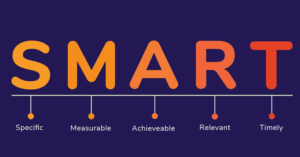
Have you ever wanted to accomplish something but the goal was too large? Did you end up giving up on that goal because of it? You could benefit from S.M.A.R.T. goal setting. It’s a kind of goal setting that helps take bigger goals and breaks them down into smaller goals so that way they are more manageable and the likelihood of you achieving that goal is increased. Let’s dive into the specifics of a S.M.A.R.T goal.
For starters, S.M.A.R.T stands for specific, measurable, attainable, relevant and timely. Following that acronym is how we create a goal and how we break it down in a way that it can actually be accomplished. Specific means exactly what it says. Your goal needs to be specific. For example: I want to be a millionaire–that’s not specific, that’s very vague and a large goal. Let’s take this example and break it down. You have to think about your first step. In order to become a millionaire, you might first need a job. So, the specifics of my goal is to get a job. Next, you have measurable, which means you have a way to track the progress of your goal. So, to continue with my example, my next step would be to send/track applications that I have sent to different employers. Next, your goal needs to be attainable. So, you need to ask yourself, “is this a goal I can actually achieve?” This is probably the most important question/step in the S.M.A.R.T goal process because if your goal is not attainable especially in a timely manner, then you need to create a different or smaller goal. In my example, is it attainable to become a millionaire? Technically, yes. But, not if you don’t have a job, so then the answer would be no, hence why our goal is to get a job because that is more attainable than being a millionaire. Next, is your goal relevant? Does it align with your values and does it actually help you to achieve your bigger, long-term goal? In our example, getting a job is the first step to becoming a millionaire, so getting a job would very much be relevant to our goal. Lastly, is your goal timely? Can you get it done in a specific amount of time? Give yourself a realistic date to have your goal achieved by. In our example, I would say that I can get a job within the next month.
Now that we just went through each step, let’s take a look at our goal in a different format:
Goal: To become a millionaire
Specific: Get a job
Measurable: Send & track my applications. Follow-up within a week after each application.
Attainable: Yes, it is possible for me to get a job
Relevant: Yes, I need a job in order to become a millionaire
Timely: I will have a job within the next month
In conclusion, goal setting is very important as it is a skill that we’ve often forgotten about, but it’s important to help accomplish things. We are oftentimes overwhelmed by the largeness and vagueness of our goals that we end up giving up on them, so having the ability to create smaller goals that you can achieve will help you in the long run. This skill will help you not become so overwhelmed by goals you’re trying to achieve.

Leave a Reply